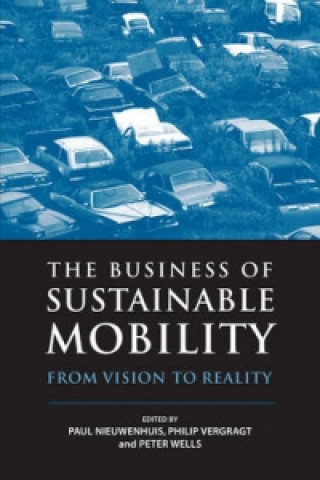
Kód: 02116124
Business of Sustainable Mobility
Autor Paul Nieuwenhuis
In many parts of the world, there is a crisis of mobility. The choices we have made over the past 200 years on modes and technologies of transport have brought us unprecedented global interaction and in many respects increased per ... celý popis
- Jazyk:
 Angličtina
Angličtina - Väzba: Pevná
- Počet strán: 256
Nakladateľ: Taylor & Francis Ltd, 2006
- Viac informácií o knihe

88.99 €
Dostupnosť:
50 % šanca Máme informáciu, že by titul mohol byť dostupný. Na základe vašej objednávky sa ho pokúsime do 6 týždňov zabezpečiť.
Máme informáciu, že by titul mohol byť dostupný. Na základe vašej objednávky sa ho pokúsime do 6 týždňov zabezpečiť.Prehľadáme celý svet
Mohlo by sa vám tiež páčiť
-

Controversial History Education in Asian Contexts
271.91 € -

Business Cycle Theory, Part II Volume 5
93.60 € -

Aphrodite
48.90 € -

Bannockburns
32.60 € -5 % -

Christmas Stable
12.91 € -10 % -

23 Problems in Systems Neuroscience
178.19 € -

Basisversorgung von Vogelpatienten
46.23 € -5 %
Darčekový poukaz: Radosť zaručená
- Darujte poukaz v ľubovoľnej hodnote, a my sa postaráme o zvyšok.
- Poukaz sa vzťahuje na všetky produkty v našej ponuke.
- Elektronický poukaz si vytlačíte z e-mailu a môžete ho ihneď darovať.
- Platnosť poukazu je 12 mesiacov od dátumu vystavenia.
Informovať o naskladnení knihy
Zadajte do formulára e-mailovú adresu a akonáhle knihu naskladníme, zašleme vám o tom správu. Postrážime všetko za vás.
Viac informácií o knihe Business of Sustainable Mobility
Nákupom získate 220 bodov
 Anotácia knihy
Anotácia knihy
In many parts of the world, there is a crisis of mobility. The choices we have made over the past 200 years on modes and technologies of transport have brought us unprecedented global interaction and in many respects increased personal freedom. However, all this mobility has come at a cost to society, to the economy and to the environment. Mobility is in crisis, but few seem aware of the full extent of it. Though most people will be aware of congestion, accidents (although this aspect is often overlooked), parking restrictions or fuel prices, few will have considered the effects of the dramatic increase in mobility expected in China, India and elsewhere. Nor do many people in their daily lives consider the impact of climate change on our environment and the contribution our cars make to it. It is often thought that technology alone can solve this problem. For some observers, salvation could be achieved by means of hydrogen fuel cells, by hybrid cars, or by increased fuel efficiency, or even by telematics to reduce congestion. This book shows that "technology" may well not be enough in itself and that for a genuinely sustainable transport future far more radical change - affecting many aspects of society - is needed. It is likely, for example, that new business models are needed, as well as users and consumers adopting new forms of behaviour. Disruptive technological innovation may well contribute, but needs to be induced by a combination of market forces and government regulation. Many studies touch on transport and mobility issues and more mainstream books aimed at challenging the dominance of automobility are common, yet works dealing with the longer-term strategic, theoretical and broader conceptual issues needed to inform the move towards more sustainable transport are rare. Yet policy-makers, practitioners, as well as many sections of academia, acknowledge a need for guidance on new thinking on sustainable mobility. This book brings together a range of views representing both leading-edge thinking and best practice in the mobility sector. The individual expert contributions form the basis for framing a broader vision of future mobility and proposed transition trajectories towards that future. Much of the effort reflected in the chapters in this book is concerned with going beyond the "technofix" of new cars, to confront the more difficult challenges of institutional, cultural and social change within and beyond the industry that have to be resolved in the transition towards sustainability. It therefore seeks to break through the conventional boundary between engineering and the social sciences, and the contributors come from both sides of this traditional but unnecessary divide, combining economists, engineers, geographers, designers and others. The work is based on the sustainable mobility stream in the 2003 International Greening of Industry Network conference in San Francisco. This event brought together experts from industry and government, and the book combines some of the papers presented there, developed and updated into full chapters, with a number of additional chapters to capture some of the themes that emerged from the conference. The central problem addressed in this book is the private car: how to power it, how to build it and how to deliver it to customers in a more sustainable future. It starts with ideas of radical innovation in the propulsion system of the car, notably the hydrogen fuel cell. In one section, the book examines business models that could be used to deliver automobility in a more sustainable manner. This section looks at how the car is made and used, and looks beyond it by examining how we could change those aspects in our quest for sustainable mobility. The book then considers a number of recently introduced vehicles and alternative vehicle concepts within the context of a dominant existing paradigm. These vary from a minimalist single-seat commuter to a powertrain exchange concept that could breathe new life into the electric vehicle. A number of chapters then report on current practice and experience in the initial moves toward more sustainable automobility. Finally, more visionary views are presented to look at what conclusions we can draw from the strands discussed and suggest possible future scenarios: where do we go from here? When thinking about the car, it is often not appreciated to what extent our modern culture is integrated with the car and its systems: we have literally built our world around the car in its current form, and this inevitably shapes the scope for constructing sustainable mobility. We therefore need to tackle any change to the current automobility paradigm on a very broad front and we need to be prepared for the possibly dramatic social and economic changes we may bring about by changing just some elements. The Business of Sustainable Mobility will be essential reading for academics, practitioners, policy-makers and others interested in the latest thinking on sustainable mobility.
 Parametre knihy
Parametre knihy
Zaradenie knihy Knihy po anglicky Economics, finance, business & management Industry & industrial studies Transport industries
88.99 €
- Celý názov: Business of Sustainable Mobility
- Autor: Paul Nieuwenhuis
- Jazyk:
 Angličtina
Angličtina - Väzba: Pevná
- Počet strán: 256
- EAN: 9781874719809
- ISBN: 1874719802
- ID: 02116124
- Nakladateľ: Taylor & Francis Ltd
- Hmotnosť: 536 g
- Rozmery: 162 × 242 × 25 mm
- Dátum vydania: 01. June 2006
Obľúbené z iného súdka
-

Wreck of the Penn Central
44.49 € -

American Railroads
42.44 € -

Box
19.57 € -12 % -

Lost Tramways of Wales: South Wales and Valleys
10.14 € -23 % -

Air Babylon
14.45 € -23 % -

English for Cabin Crew
59.05 € -

First Tycoon
20.80 € -21 % -

Airport Operations, Third Edition
67.97 € -

Union Pacific
29.52 € -10 % -

Corn Belt Route
57.20 € -

Erie Lackawanna
37.62 € -3 % -

Classic Jaguar XK
30.44 € -14 % -

Cruising Attitude
14.65 € -20 % -

Helvetica and the New York City Subway System
42.85 € -16 % -

Rover 800 Series
30.44 € -14 % -

Titanic Captain
21.93 € -4 % -

Aerotropolis
21.21 € -13 % -

Low Cost Carrier Worldwide
89.50 € -

Airport Design and Operation
299.28 € -

Traffic Engineering Handbook 7e
182.81 € -

Autocars Et Autobus Berliet
70.74 € -

Deep Sea and Foreign Going
12.29 € -23 % -

Airworthiness
152.87 € -

Branch Lines Around Portmadoc, 1923-46
29.93 € -

English for Cabin Crew: Audio CD
40.90 € -

Aircraft Safety
46.13 € -

Lighthouses
8.60 € -

Mapping the Airways
21.73 € -13 % -

Project Apollo: The Moon Landings, 1968 - 1972
20.19 € -6 % -

Towards Sustainable Aviation
59.56 € -

Crash Detectives
14.45 € -23 % -

London by Design
20.19 € -31 % -

Transport Operator Licensing
65.30 € -

Trains, Buses, People
60.28 € -

Rise and Fall of Harland and Wolff
20.50 € -5 % -

Fighting Traffic
41.41 € -11 % -

Union Pacific
25.93 € -1 % -

Intercity Bus Lines Of The Southwest
22.44 € -

British Aircraft Manufacturers Since 1909
24.91 € -13 % -

Safety is No Accident: From 'V' Bombers to Concorde
27.47 € -23 % -

Building Agreement
12.29 € -23 % -

Human Factors in Multi-Crew Flight Operations
100.98 € -

Straight and Level
65.30 € -

Practical Aviation Security
139.02 € -

Sustainable Aviation Futures
216.64 € -

Blue Funnel Line
24.08 € -13 % -

Dictionary of Aviation
32.29 € -

Air Confidential
19.98 € -13 % -

Buying the Big Jets
93.40 €
Osobný odber Bratislava a 2642 dalších
Copyright ©2008-24 najlacnejsie-knihy.sk Všetky práva vyhradenéSúkromieCookies


 21 miliónov titulov
21 miliónov titulov Vrátenie do mesiaca
Vrátenie do mesiaca 02/210 210 99 (8-15.30h)
02/210 210 99 (8-15.30h)